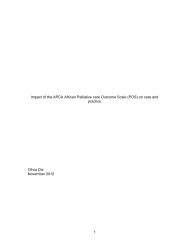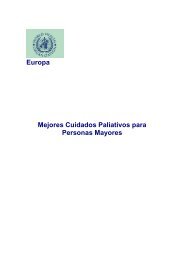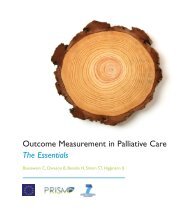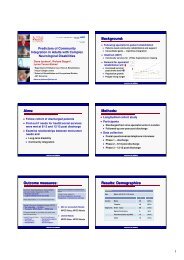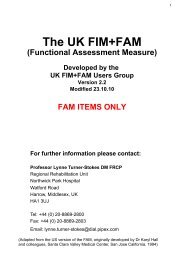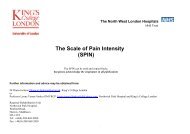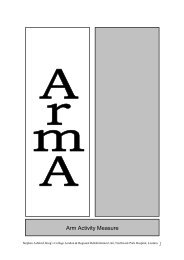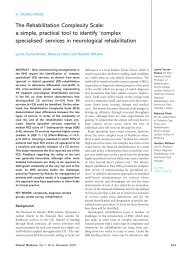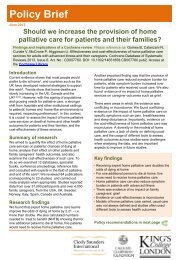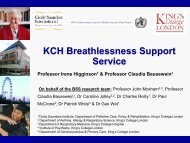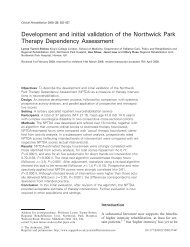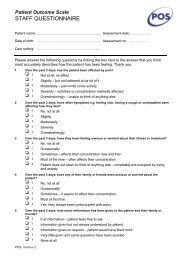2004 - 2007 - Cicely Saunders Institute - King's College London
2004 - 2007 - Cicely Saunders Institute - King's College London
2004 - 2007 - Cicely Saunders Institute - King's College London
You also want an ePaper? Increase the reach of your titles
YUMPU automatically turns print PDFs into web optimized ePapers that Google loves.
A specific ‘Palliative care for people with MS’ (PwMS)<br />
education programme was undertaken and evaluated,<br />
delivering a programme accessible to health and social<br />
care professionals working with PwMS across<br />
Southeast <strong>London</strong>. Nine study half days were<br />
undertaken and the education programme was formally<br />
evaluated, with 182 out of 234 (77%) participants<br />
describing each topic as quite or very useful.<br />
5.2 MSc, Postgraduate Diploma and Postgraduate<br />
Certificate in Palliative Care<br />
The philosophy underpinning the MSc in Palliative Care<br />
(and the new qualifications – the Postgraduate Diploma<br />
and Postgraduate Certificate) is to enable participating<br />
students to develop the skills required to appraise<br />
research and evidence on palliative care-related issues<br />
to inform their clinical practice and to develop relevant<br />
services. The MSc in Palliative Care, run in collaboration<br />
with St. Christopher’s Hospice and with the support of<br />
many talented external lecturers, who are experts in<br />
specific topics, is now very well established with a 10-<br />
year track record of providing a high class academic<br />
experience. It is distinctive from other national and<br />
international postgraduate palliative care degree courses<br />
in the following ways:<br />
1. The MSc is focused strongly on evidence and<br />
on understanding research relevant to palliative care.<br />
This is because palliative care is a relatively new<br />
specialty. Knowledge about which interventions have<br />
the potential to enhance quality of life for patients and<br />
their families, be they pharmacological, psychological,<br />
social or service-based, are still poorly<br />
understood or do not exist.<br />
2. The course is inter-professional. This allows<br />
students to explore similarities and differences in<br />
roles, skills, knowledge and their respective<br />
ideologies. It also provides scope for greater<br />
opportunity of open communication of all members<br />
within a group, consequently alleviating future<br />
hesitancy of single disciplines sharing knowledge<br />
with other professionals and non-professionals.<br />
3. The MSc, Postgraduate Diploma and Postgraduate<br />
Certificate courses are truly international. We<br />
have always encouraged applicants from beyond the<br />
UK because the different working experiences and<br />
cultures students bring with them enhance the<br />
entirety of the course. All students therefore learn<br />
about each others’ different funding arrangements for<br />
palliative care and related services, service configurations<br />
and their respective challenges, interventions to<br />
manage care, as well as the diversity.<br />
Many students who have successfully completed the<br />
course have gone on to achieve promotion within their<br />
respective professions. Of these students a large<br />
number have attributed their progression directly to the<br />
course experience. For more detail about the perceived<br />
added-value of the MSc in Palliative Care please refer to<br />
the recent evaluation of the MSc published in the<br />
Journal of Palliative Care 155 .<br />
28



